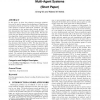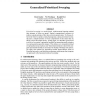458 search results - page 87 / 92 » Q-Decomposition for Reinforcement Learning Agents |
AAAI
2010
13 years 9 months ago
2010
The selection of the action to do next is one of the central problems faced by autonomous agents. In AI, three approaches have been used to address this problem: the programming-b...
ATAL
2008
Springer
13 years 9 months ago
2008
Springer
The application of reinforcement learning algorithms to Partially Observable Stochastic Games (POSG) is challenging since each agent does not have access to the whole state inform...
ATAL
2008
Springer
13 years 9 months ago
2008
Springer
In this paper, we show how adaptive prototype optimization can be used to improve the performance of function approximation based on Kanerva Coding when solving largescale instanc...
NIPS
1997
13 years 9 months ago
1997
Prioritized sweeping is a model-based reinforcement learning method that attempts to focus an agent’s limited computational resources to achieve a good estimate of the value of ...
ICML
1994
IEEE
13 years 11 months ago
1994
IEEE
Compositional Q-Learning (CQ-L) (Singh 1992) is a modular approach to learning to performcomposite tasks made up of several elemental tasks by reinforcement learning. Skills acqui...


